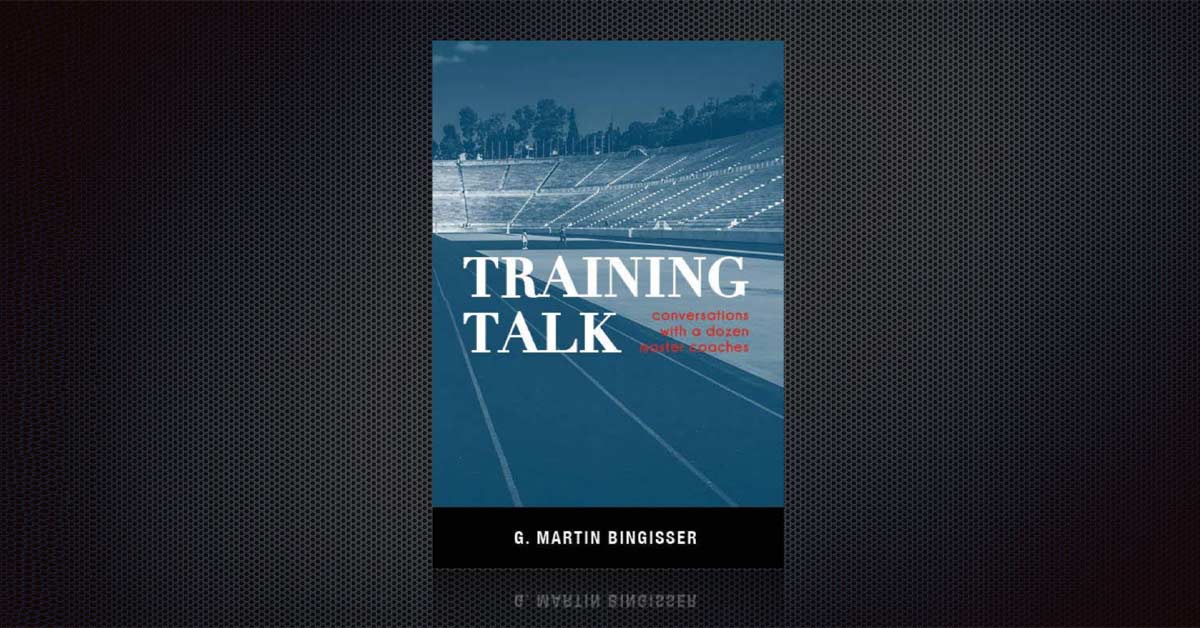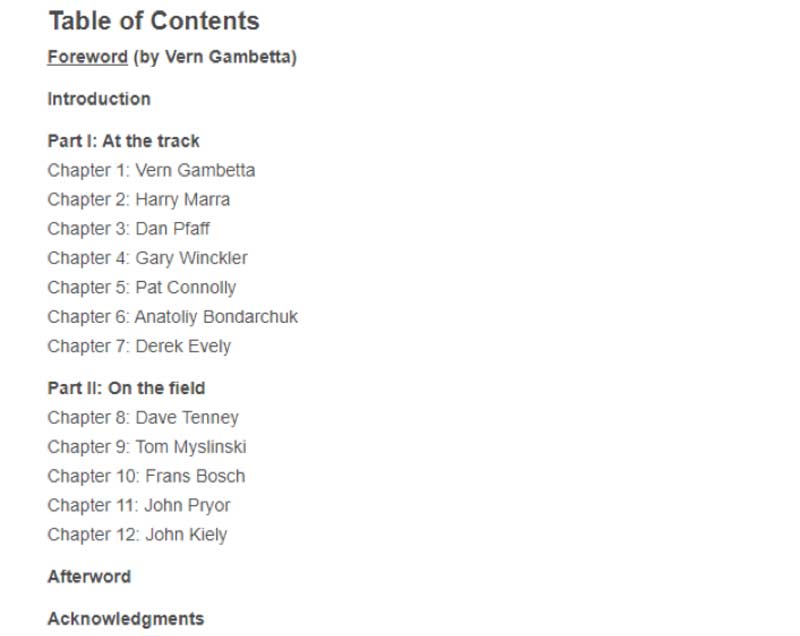
“Coaching is a question of absorbing other people’s training and adding some of your own experience.”
In summing up his introduction for Training Talk, Martin Bingisser offered this insightful commentary on the coaching development process, and it perfectly encapsulates the overall theme and value of the book. Digesting the contributions of 12 master coaches and integrating their philosophies and experience into your own practice is the ultimate message and lesson of Training Talk. The underlying theme and message threaded throughout the entire book is being willing, able, and smart enough to learn from others: other coaches, other sports, or even artistic expressions of physical mastery such as ballet.
Training Talk could represent the invitation list if a sports coach decided to play the ultimate dinner party fantasy game. Imagine if you could invite 12 master coaches over and quiz them on their training philosophies and ideas. Bingisser makes excellent use of the enviable coaching network he has developed over the years of running his HMMR Media website to produce a resource that is stuffed full of coaching insight from master coaches across a variety of disciplines.
Imagine inviting 12 master coaches over and quizzing them on their training philosophies and ideas. Share on XGiven Bingisser’s background and HMMR Media’s emphasis on track and field, it’s not surprising that Part I of the book centers around the insights from seven expert coaches in this area: Vern Gambetta; Harry Marra (Ashton Eaton’s coach); Dan Pfaff; Gary Winckler; Pat Connolly; hammer throwing coaching legend and Martin’s former coach, Anatoliy Bondarchuk; and Derek Evely.

The second half of Training Talk is devoted to physical preparation experts with a broad range of experience in field sports, predominantly across various codes of football and rugby, comprising interviews with Dave Tenney, Tom Myslinksi, Frans Bosch, John Pryor, and John Kiely.
Bingisser provides an introduction to each master coach, culminating in a synopsis of the key takeaway points from each of the interviews in the informative “Lessons to Learn” sections—a very valuable addition to such resources. Each interview has central themes and particular areas of expertise, and the reader will likely find certain contributors resonate more with them and their current situation. Given the breadth, depth, and variety of coaching experiences from the dozen experts, there are numerous, wide-ranging lessons to take away from the book.
Training Wisdom from 12 Master Coaches
The author challenges the reader not to get fixated just on the similarities among the different practitioners, but instead to also look at the differences between these coaches. The 200 pages of Training Talk are full of coaching know-how, and I’d like to provide you with a sneak peek of what some of the coaches bring to bear:
In Harry Marra’s interview, he divulges the type of coaching wisdom that can only be learned from extensive time in the trenches. It’s the kind of information you don’t get in a textbook, course, or seminar. These items typically fall under the umbrella of the art of coaching. For example, Marra outlined how he and Eaton broke down the entire decathlon into just a handful of words. Ultimately, Marra explains why the cues must come from the athlete.
Dave Tenney is now High Performance Director for the Orlando Magic NBA team, but built his reputation in North American soccer with the Seattle Sounders FC. Tenney brings a unique perspective on preparation and performance for team sport athletes, discussing topics such as sports specificity and technology. Nuggets of wisdom emanating from his section include:
“Training for team sports is about finding compromise.”
“You don’t just train the thing you want to do, you have to work the extremes.”
Training Talk also introduced me to Tom Myslinski, the head strength and conditioning coach at the Jacksonville Jaguars. As a British-born coach, I didn’t grow up on America football, so my sporting knowledge is more geared towards football (soccer), rugby, and the major team sports that most of the rest of the world play. Like many of you reading this, I was familiar with Pfaff, Gambetta, and most of the other 12 master coaches featured in the book, but Myslinski was a new name to me and his chapter was of particular interest.
The author challenges the reader to also look at the differences between these successful coaches. Share on XAs with each of the other interviews, Myslinski’s segment is bursting with coaching insights. Myslinksi’s approach and philosophy may almost seem counterintuitive at points—to the strength coach fixated upon the barbell, back squats, and max strength—but the detail makes perfect sense if you avoid getting caught up in the headlines, such as the implementation of “submaximal loading.”
Myslinski provides a great analogy for the role of the modern strength coach, which may more accurately define the role of the high performance coordinator. He talks of the need to be both below deck—down on the floor working with the athletes—and simultaneously above deck, steering the ship and looking for icebergs. The analogy neatly encapsulates the challenges faced by the modern strength coach.
“Periodisation theory is ‘eminence-based’ rather than evidence-based.”
– John Kiely
John Kiely is a prominent critic of the “science of periodisation” and a major focus of his interview centers on avoiding the planning trap, recognizing our own fallibility when it comes to predictions, and not being married to a flawed and questionable periodization strategy. For any of you who aren’t familiar with Kiely’s publications, this is a must-read

“All the coaches have a different approach, but they are confronting similar issues and their search for better feedback optimizes the process. In a world where nothing is clear, it is key to learn as much as possible from your immediate surroundings.” Author Martin Bingisser explains that many roads lead to Rome, with different coaches finding alternate solutions to similar problems, but context, awareness, and problem-solving are essential skills.
Summing Up
Bingisser exploits his wealth of coaching connections to pull together a diverse, yet complementary, mix of coaching experiences and knowledge in a high-quality, powerful resource. Despite the varied knowledge and career histories of these successful coaches, Bingisser manages to weave together the text in a manner that delivers an absorbing and insightful narrative that progresses in a logical manner.
Obviously, with many of these master coaches influencing Bingisser’s coaching journey, there is a danger of groupthink, as well as confirmation and authority biases. While each of the master coaches chosen boasts an impressive résumé, Bingisser cautions the reader to be aware of their innate biases. Training Talk rightly challenges you to ask questions of what you read, challenge your established beliefs, and adopt a critical mind-set.
Training Talk boasts vast amounts of first-class coaching insight in an easy-to-digest package. Share on XAs a collection of high-quality interviews with leading practitioners, providing insight from their years of coaching elite athletes, Training Talk packs a lot of punch for its size. Many of the coaching- or training-related resources I have recently read and reviewed have required the investment of a considerable amount of time. Training Talk boasts vast amounts of first-class coaching insight in an easily digestible package that I highly recommend.
Since you’re here…
…we have a small favor to ask. More people are reading SimpliFaster than ever, and each week we bring you compelling content from coaches, sport scientists, and physiotherapists who are devoted to building better athletes. Please take a moment to share the articles on social media, engage the authors with questions and comments below, and link to articles when appropriate if you have a blog or participate on forums of related topics. — SF


Where can I purchase this book